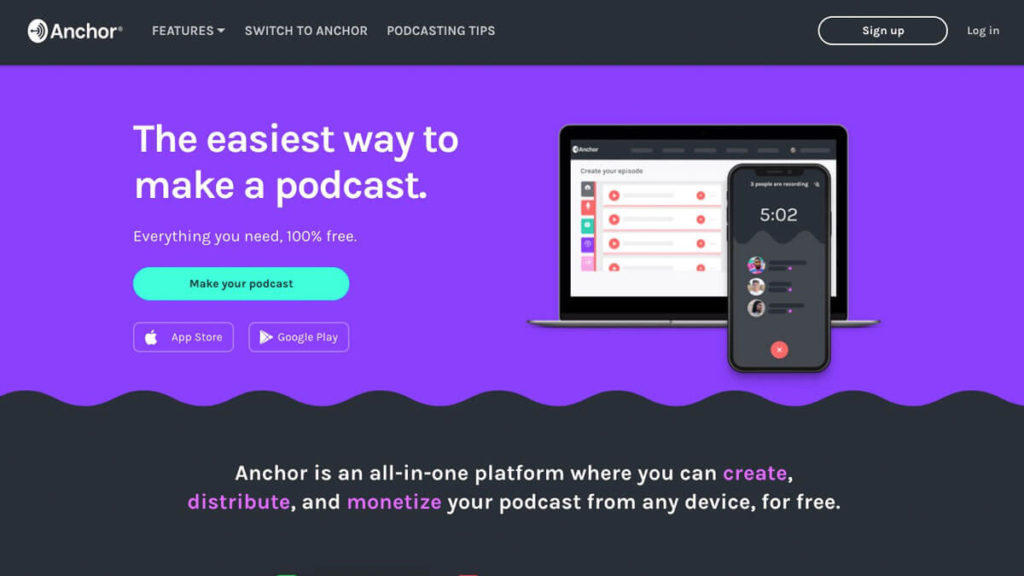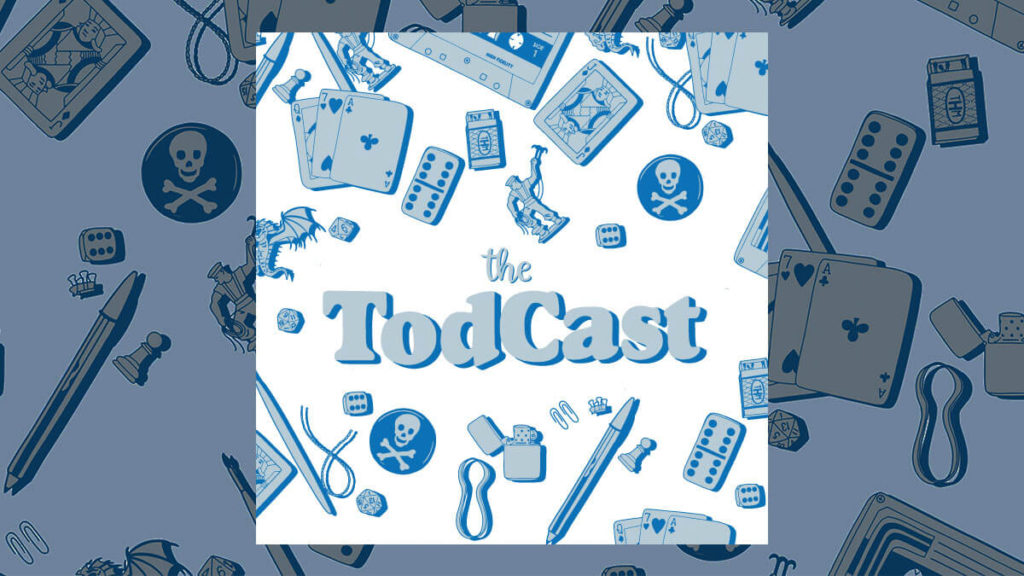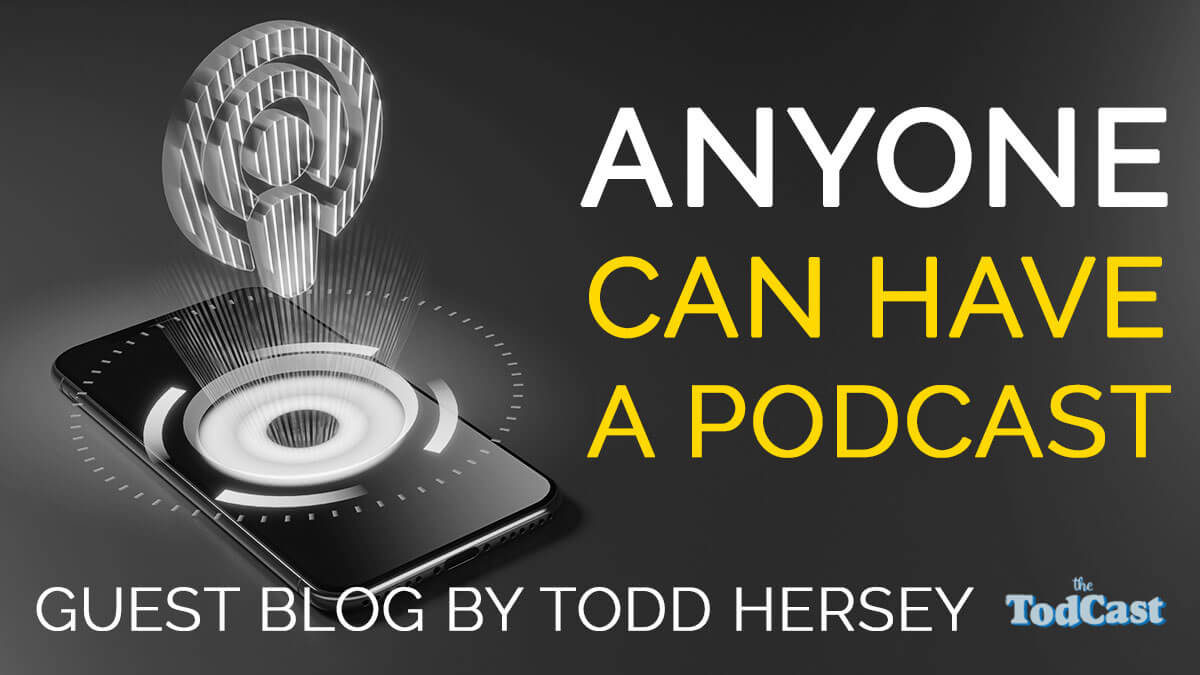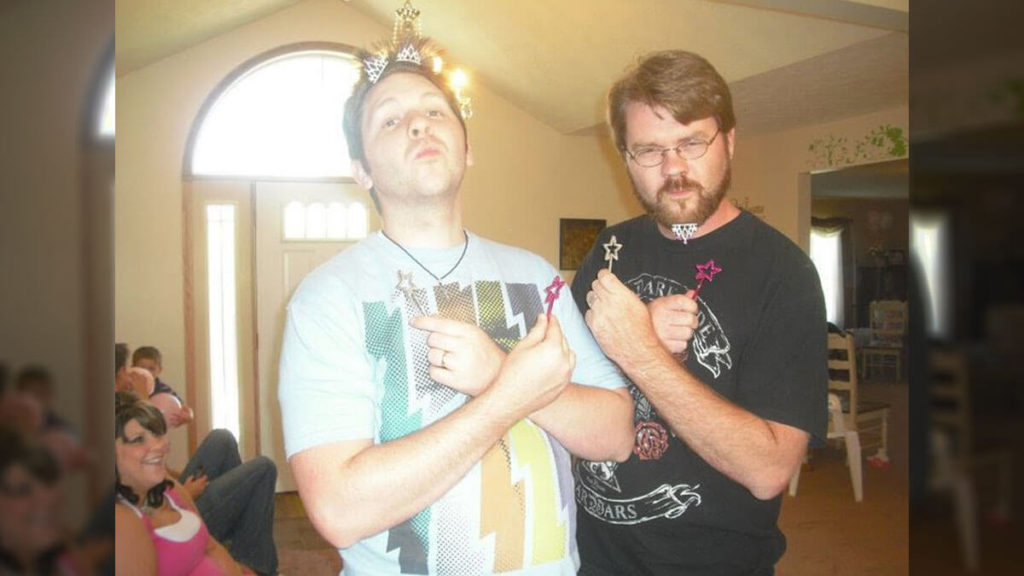Anyone Can Have a Podcast
Before we get started, I want to address my first ever ‘guest ‘. When I planned out my content calendar for the end of the year, I knew that podcasting would be a subject. It was perfect timing that my brother, Todd Hersey, just hit his 100th episode of his podcast.
I can say that I have officially listened to every single episode of his podcast (published). I was actively involved in conversation with Todd from the very start of his podcasting journey. He proved that sometimes you just have to hit record and stop getting in your own way.
Eric Hersey
Anyone Can Have a Podcast
Are you a fan of podcasts? Ever wondered what it would be like to have a podcast of your own? You can stop wondering and start recording, because I’m here to tell you that you absolutely can. It’s far simpler than you may think!
I say this because not too terribly long ago, I started my own podcast: The TodCast. I don’t have a background in audio production or distribution and if I can do it, then so can you! Let me tell you what you need as well as some lessons that I’ve learned so that you can be successful with your own podcast.
You Need a Theme
If you are considering starting a podcast, you probably already have an idea for what you’d like to talk about, so you’re already ahead of the game. If not, start brainstorming!
Since podcasts are (at their essence) simply someone talking about a topic, you need to know what you are talking about. Most podcasts have a specific theme or overarching concept that ties the individual episodes together. Generally speaking, if you can talk to someone about your podcast idea and sum it up as “I have a ________ podcast” and can easily fill in that blank, you’re in good shape. Being able to “classify” your podcast will let you know what category to apply to it in Apple Podcasts. It also, helps you target your audience so that you will get subscribers.
You Don’t Need a Ton of Gear
When I first considered starting a podcast, I spent the better part of a year without recording anything. I was under the impression that in order to have a podcast, I’d need a full recording studio. A studio filled with expensive microphones, headphones, mixing boards, and the like. I assumed that I needed to know the ins and outs of audio editing, hosting and distribution for the podcast, as well as marketing. While having access to that sort of gear and/or knowledge certainly wouldn’t hurt, you don’t actually need any of that. If you have a phone that can record audio, you can record a podcast.

The whole schtick for the TodCast is that I tell my stories while I am driving to and from work. I set my phone to record before I hit the road and just talk. When I’m done (and safely off the road) I stop the recording. It’s that simple. Due to the type of show I’m doing, I generally don’t do a ton of editing. When I do it is as easy as opening the mp3 file on my laptop and using Audacity to cut out the parts I don’t want to use. Audacity is audio editing software that is free to download and use on a Mac or PC. The point that I’m making is that I had spent approximately zero dollars in recording the first 80 or so episodes of the TodCast.
I would recommend spending some money on a quality microphone, some decent headphones, and (unless you are looking to steal my gimmick) record in a quiet place and not while behind the wheel on the highway. Since audio is the medium for podcasts, you want things to sound good. But you shouldn’t need to take out a second mortgage to accomplish this.
You Don’t Need Anyone Else
…but you might want some help. Depending on the nature of your podcast, you may be able to go it alone. If your podcast is largely just you talking about your topic, there is no problem with that! Most of the TodCast episodes are just my voice (and some occasional background noise of traffic).
However, it is often nice to have someone else with you, whether as a co-host or a rotation of special guests. I know that (based on the back-end statistics) most of my most popular episodes have been those where I’ve had a guest on with me to chat. Having another person to contribute gives another perspective and helps create content for the show. It also has the added bonus of spreading the word about your podcast to new audiences. There are many folk who will hear about your podcast from your guest star and will stick around to subscribe to the rest!
You Need a Way to Distribute Your Podcast
I’ll let you in on a secret: podcasts are not magical, high tech mystery things that you need a degree in computer science to deliver to the world. Your podcast, when it’s all said and done, is an RSS feed. Don’t know what an RSS feed is, how to make one, or what to do with one in any case? No worries. There are a bunch of places that can take your audio and not only host your audio but also create and update your feed as you add episodes. A quick internet search for “podcast hosting” will get you what you need.

Personally, I use Anchor*. One of the nice things about using Anchor is that it not only hosts the audio files and creates an RSS feed that podcast apps use to download and play the episodes, they actively send your feed to most of the places where people get their podcasts. Without any effort on my part, my podcast is automatically submitted to Apple podcasts, Spotify, Overcast, and a bunch of other places where people get their podcasts. I upload the episode and they take care of the rest.
You Need Exposure
Unless you are happy recording a podcast for the sake of a handful of listeners, you need to get the word out there so that you can be found. If no one knows your podcast exists, they can’t subscribe! Word of mouth is the simplest (and cheapest) way to get the ball rolling. I “discovered” most of the podcasts I listen to because I heard about them from a friend or family member.
Another sure-fire way to drive additional listeners to your podcast is cross-promotion. The podcast community tends to be very friendly and accommodating. If you know of another podcaster with similar interests, see if they’d be willing to have you on their show as a guest. You can also ask them to join you on your podcast. With very little effort, the two of you have simultaneously created new content for your regular listeners while expanding your audience!
You Might Want Some Money
You may be producing a podcast as part of your business. In this case, your content itself is effectively an advertisement. Also, you may be recording because you simply want to share your thoughts, opinions, or expertise on a subject and aren’t really concerned with revenue from your efforts. Just because you have a podcast doesn’t mean that you need to have ads.
At the same time, if you are putting in the effort to make a podcast and want to be rewarded for your time and trouble, the simplest way to do that is to include advertisements to your podcast. There are many ways to go about this, based largely on the platform that you use to host/distribute your podcast. For me, I can speak to the methods employed by Anchor. Again, they make it very easy to monetize your podcast, matching you to advertisers and handling the collection of funds and such.
Keep in mind that in most cases, you get paid by a metric known as CPM, or cost per mille (thousand impressions). So if an advertiser offers $15 CPM, it means that for every 1000 episodes that are downloaded, you get fifteen dollars, or 1.5 cents per download. It doesn’t seem like much, but over time (and as your podcast’s popularity grows) it adds up. You might not strike it rich by podcasting, but who knows? You might be the next big thing!
One Last Tip
Keep in mind that many people who listen to podcasts not only enjoy them when they are released, but also like binge-listening. It is often a good idea to release several episodes at once when you officially launch your podcast, so that when new listeners find it they can listen to several shows at once. The algorithms behind Apple podcasts also favor shows with the most listens within the first few days/weeks of launch. Having more episodes means more downloads during that crucial time period.
You CAN Have a Podcast!
As I said, if I can have a podcast, then you certainly can! It is a great way to share your passions, your expertise, or to expand your business. While from the outside it seems like there are barriers to entry, it is surprisingly easy to get started. Take your ideas, record them, and share them with the world!

*In the name of transparency:
I not only use Anchor’s services, but they are one of my advertisers on the TodCast. While I am getting paid to tell folks about them, I’m not getting paid for this article. In any case, I’d be plugging them anyway. Their service directly relates to what I’m trying to tell you here and I like it.

ABOUT TODD
Todd is a writer, tabletop gamer, Star Wars fan, and podcaster who enjoys sharing his knowledge with anyone who will listen. Originally hailing from the Ohio Valley, he is currently living in Columbus. He occasionally writes game articles for the tabletop gaming blog Javelina’s Game Closet. Todd hosts the TodCast, a weekly “talk radio” style podcast recorded while he commutes. He will soon be launching the Dungeon Community College podcast. This podcast focuses on teaching new and veteran gamers about the Dungeons & Dragons role-playing game. He also has a brother who makes kick-ass websites…








